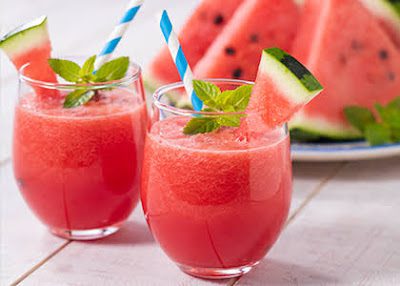When I was a child, we had a small fruit garden at the back of my father’s house where my mum grew most of the fruits we ate. But if I’m to be honest, about half of them were watermelons. I always used to wonder — why always watermelon juice? Was it just because it was sweet and refreshing, or was there something more to it?
As a kid, I never asked. But as an adult, I’ve realized my parents still love watermelon just as much, especially as juice, so I decided to dig deeper. That curiosity led me to discover that watermelon juice is more than just a tasty summer drink. It’s packed with hydrating properties, vitamins, and antioxidants that your body loves — but it can also cause issues if you overdo it.
In this article, I’ll walk you through five major benefits of drinking watermelon juice, the risks of having too much, and how much you should ideally take in a day for maximum health benefits without side effects.
Benefits of Drinking Watermelon Juice
Watermelon juice is a natural powerhouse. According to Medical News Today, it’s over 90% water, rich in vitamin C, vitamin A, potassium, and antioxidants like lycopene and beta-carotene. Let’s break down the top benefits:
#1. Superior Hydration & Electrolyte Balance
Because watermelon juice is mostly water, it’s one of the best natural ways to stay hydrated. According to the Mayo Clinic Health System, proper hydration supports healthy digestion, temperature regulation, and nutrient delivery throughout the body.
The juice also contains potassium and magnesium, which help maintain electrolyte balance and prevent muscle cramps.
Drinking watermelon juice during hot weather or after workouts can help replace fluids lost through sweat. It’s like nature’s sports drink — without the artificial sugars or colors found in many commercial hydration products.
#2. Supports Heart Health
The American Heart Association highlights potassium and lycopene as key nutrients for heart health, both found abundantly in watermelon. Potassium helps manage blood pressure by relaxing blood vessel walls, while lycopene has been linked to reduced LDL (“bad”) cholesterol.
Regular consumption may contribute to better cardiovascular function over time. In fact, a 2014 study in the American Journal of Hypertension found that watermelon extract supplementation helped reduce blood pressure in adults with prehypertension.
#3. Improves Skin Health
According to Verywell Health, the vitamin C in watermelon is crucial for collagen production, which keeps skin firm and elastic. Lycopene also protects the skin from UV damage, while hydration from the juice helps maintain a natural glow.
Two glasses of watermelon juice a day may support skin repair, reduce dryness, and promote even skin tone — especially when paired with a balanced diet rich in other fruits and vegetables.
#4. Eases Muscle Soreness
Watermelon contains L-citrulline, an amino acid shown to reduce muscle soreness. A 2013 study in the Journal of Agricultural and Food Chemistry found that athletes who consumed watermelon juice before workouts experienced less muscle discomfort afterward. It works by improving blood flow, which speeds up the removal of lactic acid from muscles. That’s why it’s a favorite among some athletes and fitness enthusiasts.
#5. Supports Digestive Health
Because of its high water content and small amount of dietary fiber, watermelon juice helps keep bowel movements regular. Hydration is key for preventing constipation, and fiber supports healthy gut bacteria. It’s a gentle, natural way to support digestion without harsh laxatives — making it ideal for people with sensitive stomachs.
📌📍If you’re also looking for natural ways to nourish your skin from the outside, you may want to read my post on Turmeric Soap — a gentle, glowing skincare essential.
Possible Side Effects of Drinking Too Much Watermelon Juice
While watermelon juice is healthy, overconsumption can cause certain problems.
#1. Excess Sugar Intake
Even though it’s natural sugar, watermelon juice still contains fructose. According to Healthline, drinking too much can lead to blood sugar spikes — especially for people with diabetes or insulin resistance. This is because juicing removes most of the fiber, allowing the sugar to enter the bloodstream faster. Limiting your intake helps avoid unnecessary sugar overload and keeps blood sugar levels stable.
#2. Digestive Discomfort
Watermelon contains sorbitol, a sugar alcohol that can cause bloating, gas, and diarrhea in sensitive individuals. According to the Mayo Clinic, consuming large amounts of sorbitol-rich foods can trigger discomfort, especially in people with irritable bowel syndrome (IBS). If you notice stomach upset after drinking watermelon juice, try reducing your portion size.
#3. Possible Mineral Imbalance
Since watermelon is high in potassium, overconsumption may cause hyperkalemia — an excess of potassium in the blood. According to the National Kidney Foundation, this can be dangerous for individuals with kidney problems, leading to irregular heartbeat and muscle weakness. Healthy individuals are unlikely to experience this from normal consumption, but moderation is still important.
How Much Watermelon Juice Should You Drink Daily?
The ideal amount depends on your health and activity level. According to Verywell Fit, 1–2 cups (240–480 ml) per day is safe for most healthy adults and provides hydration plus nutrients without excessive sugar.
If you’re physically active or in hot weather, you may go slightly higher, but remember — juice should complement, not replace, whole fruits. Eating the flesh gives you more fiber, which helps regulate sugar absorption.
Conclusion
Watermelon juice isn’t just refreshing — it’s a nutrient-packed drink that can hydrate you, protect your heart, and support your skin, muscles, and digestion. Its natural sweetness makes it an easy choice for both kids and adults, and it’s a great alternative to sugary sodas or energy drinks.
However, like all good things, moderation matters. Drinking reasonable amounts can give you all the health benefits without the risks of excess sugar or potassium. So, the next time you pour yourself a glass, enjoy it knowing you’re giving your body a tasty boost — just keep it balanced.








